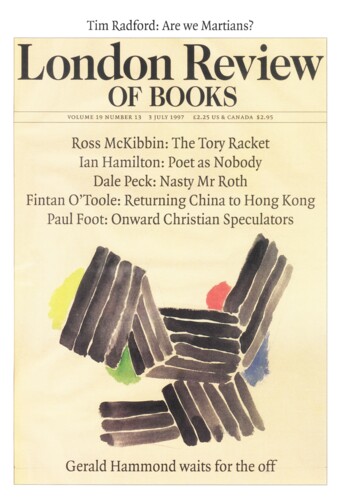Turtles All the Way Down
Walter Gratzer, 4 September 1997
What John Horgan means by his teasing title, inspired evidently by Francis Fukuyama’s view of history, is not that scientists will run out of work worthy of all that trouble and expense, but that the great discoveries, on which the intellectual edifice rests, have carried us up to or beyond the point of diminishing returns. Not only are the major problems that confronted physics before, say, Einstein, and biology before Darwin, now solved, but the mysteries that remain are of their nature inaccessible to the scientific process: we can formulate no testable hypotheses about such posers as the origin, structure and fate of the universe or the nature of consciousness. It is no good reminding Horgan that at least one British university disestablished its Chair of Experimental Philosophy at the end of the 19th century on the grounds that physics had hit the buffers, or that Baeyer, the leading organic chemist of his day, urged his assistants to finish off the structure of the terpenes, so that a line could be drawn and the field abandoned to the despised Schmierchemiker (or as we would call them, biochemists). He is doubtless also aware that Kelvin gave the composition of the sun as an example of the kind of question that would never be answered; and that soon afterwards Bunsen and Kirchhoff, on their daily constitutional around the Philosophers’ Walk at Heidelberg, stopped in their tracks, struck by the thought that a spectroscopic analysis of the sun’s light could indeed reveal what it was made of. For Horgan assures us that he has heard this facile argument too often and that it crumbles under the weight of what science has achieved since those days of innocence. All avenues have been explored and nothing remains but to clear up the details (numerous, to be sure) and apply what we have learned to improving the human lot.


